European Union supporters in Latvia and Estonia expressed concern Thursday about a new survey pegging their countries as the most EU-skeptical in Europe
Published:
4 August 2003 y., Monday
European Union supporters in Latvia and Estonia expressed concern Thursday about a new survey pegging their countries as the most EU-skeptical in Europe—findings that come just two months before both Baltic states hold referendums on membership. A mere 32 percent of Estonians and 37 percent of Latvians agreed entry would be "a good thing," making them the most pessimistic of those questioned in the EU study released Wednesday. By contrast, 72 percent of Cypriots and 61 percent of Poles said joining would be good for them.
Latvia and Estonia will be the last of 10 EU candidate countries to put the issue of entry to a vote—and observers say there's now a chance that one or both nations could become the first to reject membership in Europe's most powerful multilateral club.
"People are afraid, they don't know what to believe and they're confused," said Pille-Mai Helemae, spokeswoman for the high-profile "Yes to the EU" group in Estonia. "It's going to be a hard fight. But in the end, I'm sure enough people will see more pros than cons to membership." Confusion about the EU was illustrated in the biannual Eurobarometer _ which questioned 1,000 people in each candidate nation in May—with 62 percent of Latvian and 71 percent of Estonian respondents saying they were either poorly informed about the accession process or not informed at all.
The Czech Republic, Hungary, Lithuania, Poland, Slovakia, Slovenia and Malta have already approved EU referendums, most by wide margins. Cyprus is leaving it's decision to lawmakers. If Estonia and Latvia pass their plebiscites on Sept. 14 and Sept. 20 respectively, they would join the EU together with the other candidates in 2004.
Virtually all top leaders in Estonia and Latvia have been pro-EU since the Baltic Sea nations regained independence—arguing that entry will raise their nations international stature, forge vital European trade links and boost living standards.
But official enthusiasm has never been matched outside the halls of power, with many Estonians and Latvians fearing a loss of sovereignty to the EU. Anti-EU groups compare what they say is an overly centralized EU with the U.S.S.R.; one of their symbols is an EU flag stamped with a Communist hammer and sickle.
If the results of the latest survey spooked EU supporters, they delighted opponents. "If you're a EU supporter, I believe the picture is even blacker," said Uno Silberg, who heads Estonia's "No to the EU Movement." "We're confident the referendum will fail."
Šaltinis:
balticsww.com
Copying, publishing, announcing any information from the News.lt portal without written permission of News.lt editorial office is prohibited.
The most popular articles
 For the last 15 years European citizens living in another European country have been able to vote in that country's local and European elections.
more »
For the last 15 years European citizens living in another European country have been able to vote in that country's local and European elections.
more »
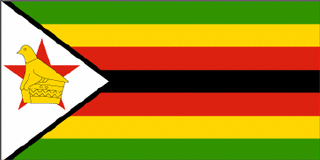 Zimbabwe is suffering from cholera.
more »
Zimbabwe is suffering from cholera.
more »
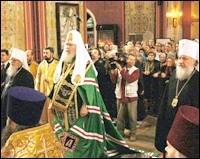 Metropolitan Kirill will head the Russian Orthodox Church temporarily following the death of Patriarch Alexiy II on Friday.
more »
Metropolitan Kirill will head the Russian Orthodox Church temporarily following the death of Patriarch Alexiy II on Friday.
more »
 U.S President George W. Bush celebrates his final Christmas in office - the lighting of the National Christmas tree.
more »
U.S President George W. Bush celebrates his final Christmas in office - the lighting of the National Christmas tree.
more »
 Under new draft laws, people travelling by bus and ship would enjoy the same rights as those taking a plane or train, including the right to meals, hotel accommodation and alternative services if the trip is cancelled or interrupted.
more »
Under new draft laws, people travelling by bus and ship would enjoy the same rights as those taking a plane or train, including the right to meals, hotel accommodation and alternative services if the trip is cancelled or interrupted.
more »
 The importance of individual happiness, which can be achieved with the help of universal human values - whether religious or non-religious - was one major theme in an address by the 14th Dalai Lama to the European Parliament on Wednesday.
more »
The importance of individual happiness, which can be achieved with the help of universal human values - whether religious or non-religious - was one major theme in an address by the 14th Dalai Lama to the European Parliament on Wednesday.
more »
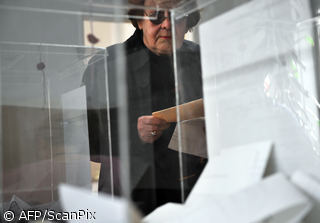 Although the European Parliament is now much more powerful than when it was first directly elected in 1979, voter turnout for elections has declined steadily, reaching a new low in 2004.
more »
Although the European Parliament is now much more powerful than when it was first directly elected in 1979, voter turnout for elections has declined steadily, reaching a new low in 2004.
more »
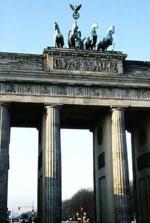 The free tours are run by Sandemans New Europe - set up in 2004 by Chris Sandeman, who chose tourism over his family's traditional sherry business.
more »
The free tours are run by Sandemans New Europe - set up in 2004 by Chris Sandeman, who chose tourism over his family's traditional sherry business.
more »
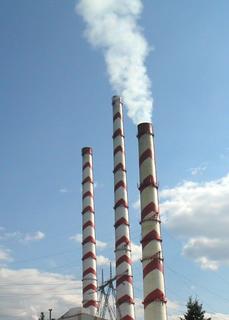 Eighteen months after it began work, Parliament's Temporary Committee on Climate Change called for an 80% cut in greenhouse gases by 2050, binding interim targets to improve energy efficiency 20% by 2020 and incentives to encourage everyone to do their bit.
more »
Eighteen months after it began work, Parliament's Temporary Committee on Climate Change called for an 80% cut in greenhouse gases by 2050, binding interim targets to improve energy efficiency 20% by 2020 and incentives to encourage everyone to do their bit.
more »
 Israeli experts are using good old mathematical models to give a face in a photo the ideal characteristics in just a few mouse clicks.
more »
Israeli experts are using good old mathematical models to give a face in a photo the ideal characteristics in just a few mouse clicks.
more »